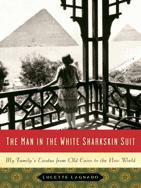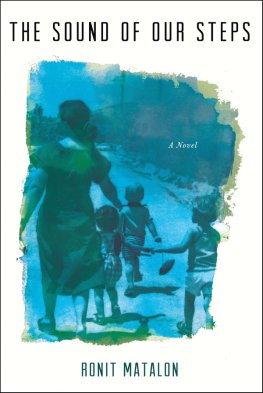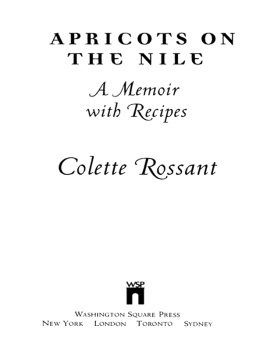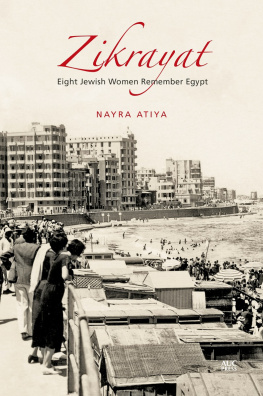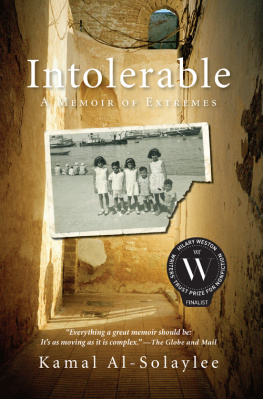
THE MAN IN THE WHITE
SHARKSKIN SUIT
My Familys Exodus
from Old Cairo to the New World
LUCETTE LAGNADO

To my husband, Douglas Feiden,
and to the memory of Leon and Edith
And the Children of Israel wept and said: Who will feed us meat? We remember the fish that we ate in Egypt free of charge, and the cucumbers, melons, leeks, onions, and garlic. But now, our life is parched, and there is nothing. We have nothing to anticipate but manna.
Numbers 11:46
It was then that I stood up in the theater and shouted: Dont do it. Its not too late to change your minds, both of you. Nothing good will come of it, only remorse, hatred, scandal, and two children whose characters are monstrous.
Delmore Schwartz, In Dreams Begin Responsibilities
CONTENTS
Epigraph
Prologue: A Courtship in CairoSpring 1943
BOOK I: THE CAPTAIN CAIRO, 19421963
BOOK II: THE EXILE PARIS, AND THEN NEW YORK, 19631982
Epilogue: Cairo, Finally, and AgainSpring 2005
Acknowledgments
Selected Bibliography
About the Author
Other Books by Lucette Lagnado
Credits
Cover
Copyright
About the Publisher
E dith was seated outdoors at La Parisiana, Cairos most popular caf, enjoying a caf turque with her mother, when she noticed the man in white. He was looking her way and smiling, and though he, too, was sitting down, she could tell he was extremely tall. He raised his glass and tipped it in her direction. She was so shy, she quickly turned her head, not daring to return his glance.
There was never room for the mildest flirtation in Ediths life. Her mother, Alexandra, was always by her side, policing her every move, so strict she didnt permit her daughter to have any dealings with men that even hinted at romance. At twenty, Edith had never had a suitor. She wasnt allowed to engage in the light, friendly banter that was encouraged between the sexes in wartime Cairo, a culture that managed to be both old-fashioned and libertine at the same time.
Early on, her mother had laid down the law.
Edith was expected to come straight home from work at the end of the day. She couldnt socialize with colleagues, especially male colleagues, and she was to shun any and all advances from the eminently respectable bachelors who taught alongside her at the cole Cattaoui. A teacher of children, Edith was treated like a child in her own home.
She was so meek, she never chafed at the restrictions. She was simply grateful to have a job at the distinguished private school that had hired her when she was barely fifteen, and whose main benefactors were Moise Cattaoui, a Jewish Pasha, and one of the wealthiest men in Egypt, along with his socially prominent wife, Madame Cattaoui Pasha, who was the queens lady-in-waiting.
Of course, Alexandra had never reckoned with anyone like the man in white, and neither had her woefully naive daughter.
At forty-two, Leon was used to getting his way, especially with women. He had never been married and, like Edith, he lived at home with his mother. But the resemblance ended there. Unlike her, he suffered from no restrictions on his life whatsoever.
Cairo had a million diversions, and Leon took advantage of every one of them. He relished being single, venturing out every night and not returning until dawn. He ambled elegantly through the city in constant search of entertainment. Dining, dancing, and gambling were his great loves, and he wandered from restaurants to cafs to dance halls to casinos. It was 1943, the height of World War II, and the streets and the cinemas and the nightspots were crowded with British soldiers in their khaki uniforms and jaunty berets, which suited Leon fine because he didnt love anyone as much as he loved les Anglais.
Wherever he went, he stood out, a towering figure in expensive, hand-tailored suits made of white sharkskin.
The soft shiny material was all the rage among Cairos privileged classes.
Hed stop and catch his breath only on Friday night, the Jewish Sabbath, because he took religion as seriously as his games and pastimes. Early on, Leon had figured out a way for these seemingly contradictory sides of his nature, his love of God and his passion for pleasure, to coexist. He was a regular at temple on Friday night and Saturday morning, but come Saturday night, his exuberant, frivolous life resumed and continued uninterrupted throughout the week.
In contrast, most of Ediths evenings were spent quietly at home in Sakakini, a poor section of Cairo, with her mother and her younger brother, Flix, as her sole companions. If she wanted to see a movie or go to a caf, it was arm in arm with Alexandra. Dance halls, cabarets, nightclubs, were off-limits. There were no escapes and few pleasures for the young woman, except for the books she devoured.
She worked so hard at the cole Cattaoui, she caught the eye of its famous patron. Madame Cattaoui Pasha, intrigued by her diligent, lovely recruit, offered her a job as librarian of the Bibliothque Cattaoui. It was an extraordinary opportunity. The pashas wife had a vision she wanted Mademoiselle Edith to realize: to build a school library that would house all the great French classics.
Still a teenager, operating on instinct since she had no formal training as a librarian, Edith went on a buying spree, purchasing hundreds of books. After months of feverish acquisitionsFlaubert, Proust, Balzac, Zolashe was able to report that the collection was almost complete.
Madame Cattaoui Pasha was so pleased, she gave the young woman a gift: a key to the libraryenormous, brass, shiny, ornate. Ediths hand trembled as she accepted it. It was the single greatest honor she would ever receive. For Edith, it was as if she had been handed the Keys to the Kingdom.
Leon had no patience for the contemplative life, and the only books he pored through were his prayer books and his Bible, though his favorite reading material was probably La Bourse Egyptienne, the popular financial newspaper that tracked the Egyptian stock market.
He began each day by praying with fellow Jews. He did business with French Colonial merchants and Greek entrepreneurs. He gambled with wealthy Egyptians, including, on occasion, the king. And he socialized with the British officers stationed throughout Cairo. Always stylish and meticulously dressed, with an easy manner and a fluent command of English, Leon was one of the few outsiders they welcomed into their fold.
They even had an affectionate nickname for him: Captain Phillips. No one knew its origins, but it was quintessentially British, and it stuck because he wore it so well. All around Cairo Leon became known as The Captain. The French called him Le Capitaine.
Cairo came alive at night. The workday ended early because it was so hot in the afternoon. People returned home from the office, took a long nap, and woke up refreshed and energized enough to go out again. The picture shows at the dozens of outdoor cinema houses didnt even start until nine. It was not uncommon to have dinner at eleven. No self-respecting belly dancer would even think of making an appearance until the stroke of midnight.
Next page
